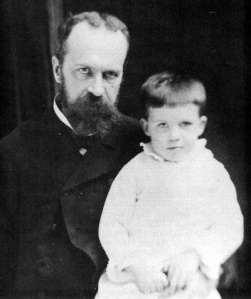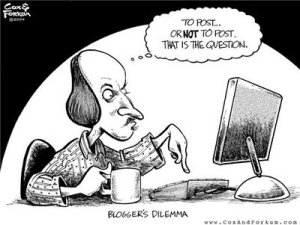
LISTEN...WATCH. Can't resist that tag-line, on our first designated class-date (we'll be Zooming tonight) of the July mini-semester. "What an awful trade..."* But no, not really, not at all. I love talking with students, and I couldn't do it without all those words.
But it is always crucial for all of us in the verbalities-and-verbosities trade [OACB]to remind ourselves that everything cannot be converted to them. So, with that proviso, let's talk.
It’s 1883, James is 41 and a success in his chosen vocation (about to be promoted to full professor). Like many who marry relatively late, it’s taken him awhile to settle comfortably into the group dynamic of family life and the checks it inevitably places on a bachelor’s accustomed unconditioned freedom. But settle he has, and the stability and safe haven of home are reflected in the growing confidence of his philosophic voice.
But it is always crucial for all of us in the verbalities-and-verbosities trade [OACB]to remind ourselves that everything cannot be converted to them. So, with that proviso, let's talk.
===
It’s 1883, James is 41 and a success in his chosen vocation (about to be promoted to full professor). Like many who marry relatively late, it’s taken him awhile to settle comfortably into the group dynamic of family life and the checks it inevitably places on a bachelor’s accustomed unconditioned freedom. But settle he has, and the stability and safe haven of home are reflected in the growing confidence of his philosophic voice.
Death has not taken a holiday. His mother and father are recently departed. Younger brother Wilky will soon join them. Then, William and Alice will lose a child (18-month old Herman). We forget how precarious life was, day to day, not so long ago.
The shocking death of his little son coalesced with the lingering grief James continued to feel for his parents. Years later he would attest: “To anyone who has ever looked on the face of a dead child or parent, the mere fact that matter could have taken for a time that precious form, ought to make matter sacred for ever after… That beloved incarnation was among matter’s possibilities.”
James had no insuperable problem with metaphysical materialism. Determinism, however, was another matter. “The Dilemma of Determinism” began as a Harvard lecture in 1884, and it would remain one of James’s clearest statements of objection to the denial of free will. Like I.B. Singer’s, his position was unequivocal (if also a bit ironic and self-deprecating). Did he believe in free will? “Do I have a choice?”
“The Dilemma of Determinism” began as a Harvard lecture in 1884, and it would remain one of James’s clearest statements of objection to the denial of free will. Like I.B. Singer’s, his position was unequivocal (if also a bit ironic and self-deprecating). Did he believe in free will? “Do I have a choice?”
 “The Dilemma of Determinism” began as a Harvard lecture in 1884, and it would remain one of James’s clearest statements of objection to the denial of free will. Like I.B. Singer’s, his position was unequivocal (if also a bit ironic and self-deprecating). Did he believe in free will? “Do I have a choice?”
“The Dilemma of Determinism” began as a Harvard lecture in 1884, and it would remain one of James’s clearest statements of objection to the denial of free will. Like I.B. Singer’s, his position was unequivocal (if also a bit ironic and self-deprecating). Did he believe in free will? “Do I have a choice?”
Citing the example of a brutal spousal murder, James again challenges the reader to feel the preposterous implausibility of hard determinism. “For the deterministic philosophy, the murder [was] necessary from eternity.” Can we believe it? No, “something else would really have been better in its place.”
James sees the dispute between determinism and freedom as decisive, as requiring definite decision. One must choose between these incompatible visions:
“Of two alternative futures which we conceive, both may now be really possible; and the one becomes impossible only at the very moment when the other excludes it by becoming real itself. Indeterminism thus denies the world to be one unbending unit of fact. It says there is a certain ultimate pluralism in it… To that view, actualities seem to float in a wider sea of possibilities from out of which they are chosen… Determinism, on the contrary, says they exist nowhere, and that necessity on the one hand and impossibility on the other are the sole categories of the real. Possibilities that fail to get realized are, for determinism, pure illusions: they never were possibilities at all. There is nothing inchoate, it says, about this universe of ours, all that was or is or shall be actual in it having been from eternity virtually there… The issue, it will be seen, is a perfectly sharp one, which no eulogistic terminology can smear over or wipe out. The truth must lie with one side or the other, and its lying with one side makes the other false.”
James has also now begun serious work on what will eventually be published as Principles of Psychology, and he’s named the “wonderful stream of consciousness” for which he is still largely remembered. His delightfully pictorial imagination likens consciousness to avian flights and perchings (the transitive and substantive forms of experience),  and he refuses to accept the notion that whatever is real is always conceptually and nominally precise. Language is limited. It dulls our powers of discernment and discrimination. Non-verbal experience is rich, but difficult to contain and identify. It acquaints us, for instance, with vague feelings of relation (like the feeling of “if,” “and,” or “but”) that are no less real than more substantive things. It is evanescent, impressionistic, fluid, streamy.
and he refuses to accept the notion that whatever is real is always conceptually and nominally precise. Language is limited. It dulls our powers of discernment and discrimination. Non-verbal experience is rich, but difficult to contain and identify. It acquaints us, for instance, with vague feelings of relation (like the feeling of “if,” “and,” or “but”) that are no less real than more substantive things. It is evanescent, impressionistic, fluid, streamy.
 and he refuses to accept the notion that whatever is real is always conceptually and nominally precise. Language is limited. It dulls our powers of discernment and discrimination. Non-verbal experience is rich, but difficult to contain and identify. It acquaints us, for instance, with vague feelings of relation (like the feeling of “if,” “and,” or “but”) that are no less real than more substantive things. It is evanescent, impressionistic, fluid, streamy.
and he refuses to accept the notion that whatever is real is always conceptually and nominally precise. Language is limited. It dulls our powers of discernment and discrimination. Non-verbal experience is rich, but difficult to contain and identify. It acquaints us, for instance, with vague feelings of relation (like the feeling of “if,” “and,” or “but”) that are no less real than more substantive things. It is evanescent, impressionistic, fluid, streamy.
*One of my favorite James quotes come from this middle period. “What an awful trade that of professor is– paid to talk, talk, talk. What an awful universe it would be if everything could be converted to words, words, words.”
Being open and hospitable to the non-verbal dimensions of life, and being conscientious in his devotion to building the fledgling field of psychology into an inclusive science, James at this time got seriously into the world of the paranormal. He attended countless psychic seances conducted by “spirit mediums,” alert to possibilities no longer taken seriously by scientists in our time but still wildly popular with the devotees of contemporary media stars like James van Praagh and John Edward.
It bothered James that there was “a mass of (alleged) testimony about such things, at which the only men capable of a critical judgment– men of scientific education– will not even look.”
Is such testimony fraudulent? You won’t know if you don’t check it out. If you don’t, you’re as guilty of self-deception as the worst “spiritualist” showman. “There is no source of deception in the investigation of nature which can compare with a fixed belief that certain kinds of phenomenon are impossible.”
Originally published 10.23.09
==
Postscript. Another significant evolutionary anniversary today:
1858 The joint reading of Charles Darwin and Alfred Russel Wallace's papers on evolution to the Linnean Society. OnThisDay.com
No comments:
Post a Comment